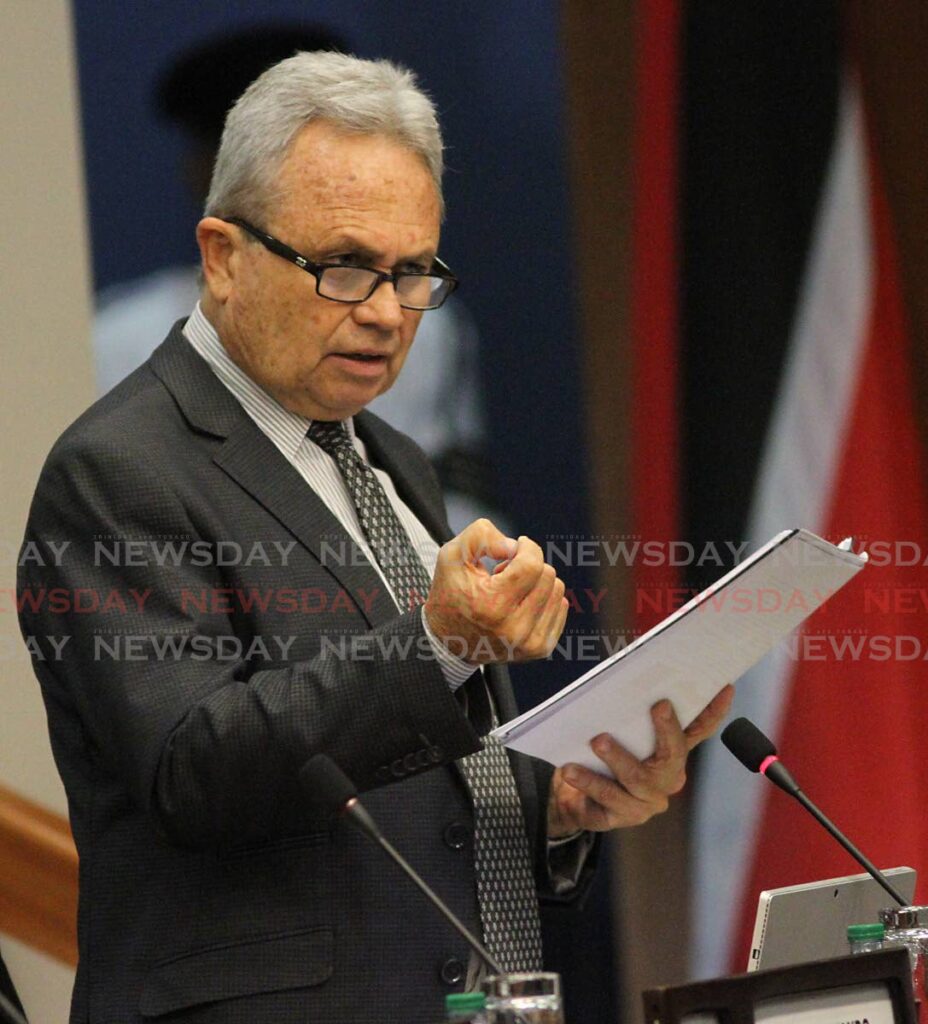Imbert: Four months to buy a drinking glass under current law

FINANCE Minister Colm Imbert on Thursday justified a new procurement bill by saying under the current law it could take a state body as long as four months to buy an item as simple as a drinking glass. He was in the Senate piloting the Public Procurement and Disposal of Public Property (Amendment and Validation) Bill, 2023 to the amend the Public Procurement and Disposal of Public Property Act 2015.
"Hyperbole and nonsense" were how he dubbed Opposition fears that the bill would gut TT's procurement legislation.
Regarding criticism of proposals to exempt acquisitions/disposals of up to $1 million from the procurement act, he said a threshold has existed since 1961. He said under the Central Tenders Board Ordinance, in 1961 the exemption threshold for an accounting officer's minor purchases was $10,000.
It had been increased to $100,000 in 1983, $500,000 in 1984, and now $1 million since 2010. He added. "That threshold is subject to regulation."
He said the World Trade Organisation (WTO) had recommended exemption thresholds in areas including aid, troops and international agencies, while the Caribbean nations of Antigua and Barbuda, Barbados and Belize have thresholds of US$150,000, virtually equivalent to the bill's proposed $1 million.
"Exemptions are part and parcel of modern procurement laws."
Imbert warned that reports from Jamaica were of a 25 per cent decease in the government's development programmes under their national budget simply because public service accounting officers were "afraid, unfamiliar and unsure of what they should do" regarding procurement rules which impose hefty fines and imprisonment.
He detailed at length how a procurement procedure – inclusive of a pre-qualifying period – for an item as simple as a drinking glass could take up to four months.
Imbert said a procurement process entailed the registering of companies for pre-qualification inclusive of them ensuring their taxes (VAT and corporation tax) and National Insurance Scheme contributions were all up to date. He said the total period of up to four months did not include any additional time delay incurred by a challenge to a particular procurement exercise. "There must be a simplified procedure for routine matters."
He said it could not be the case that one had to wait four months just to buy toner for a photocopier.
Imbert noted that Coast Guard vessels need constant upkeep and so under a restrictive procurement regime could be out of service due to acquisition problems for items as trite as a seal, ring or screw. "An entire vessel can be immobilised because it needs a ball bearing."
He said the Coast Guard now has a credit card facility to buy such items up to a value of US$15,000.
Imbert lamented that a child in need of urgent surgery might apply to the Children's Life Fund but this facility was subject to procurement rules. He said if the child needed to be treated at a hospital such as in South America or the US, the hospital must first pre qualify and register under the Procurement Act, which he did not think they would wish to bother to do.
"That is an example we need to look at urgently," he said.
"Are you going to tell a hospital in Miami, 'Produce your audited financials or we'll not let you deal with a child with a hole in his heart?'"
Imbert then wondered at the logic of a competitive bid and a sole select bid taking the same period of time under the procurement rules.
Predicting what would happen without the bill's passage, he said, "The procurement of routine items could become impossible and grind the country to a halt."

Comments
"Imbert: Four months to buy a drinking glass under current law"